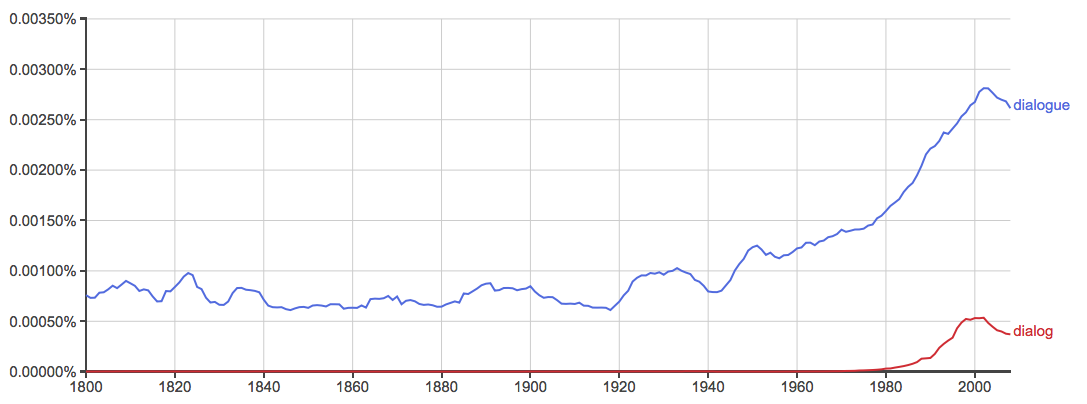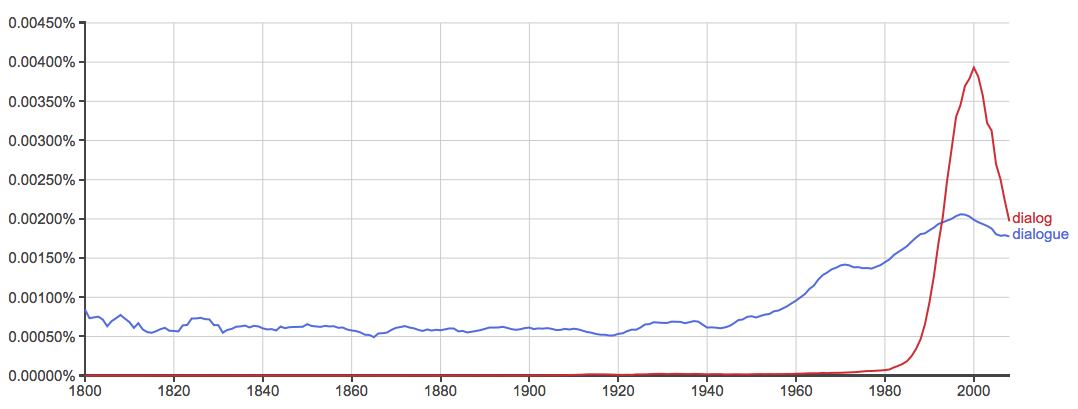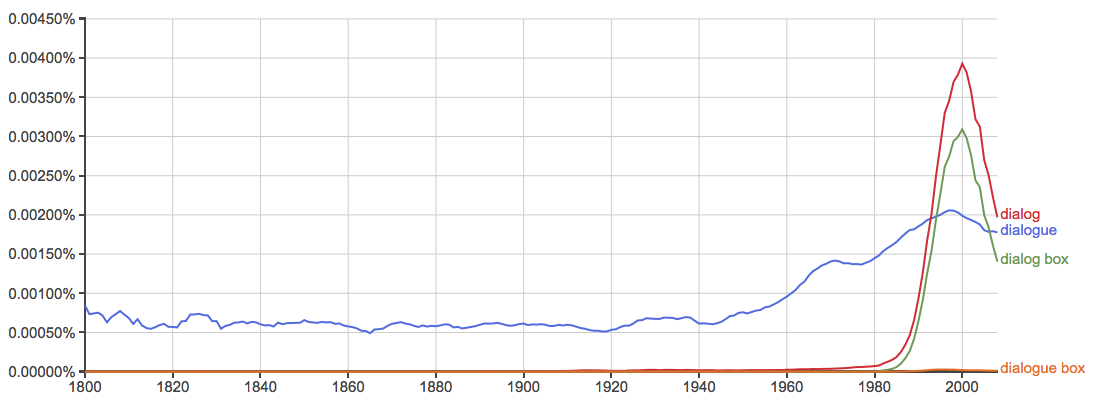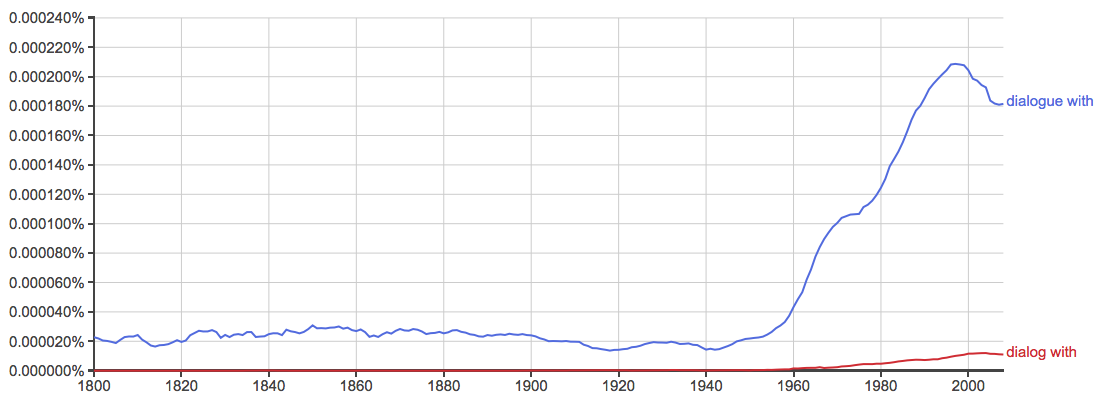If you were a novelist or a playwright, what word would you use to describe a conversation between two or more characters in your work?
Are you writing dialogue or dialog between them? Or is there any difference at all?
What is the Difference Between Dialog and Dialogue?
In this post, I want to outline the different uses of these two words. I will use real-world examples from newspapers and magazines to demonstrate their meanings, and I will advise you on how to use them in the future.
After reading this post, you shouldn’t have any more trouble with dialog vs. dialogue.
When to Use Dialog
What does dialog mean? Dialog is a variant of dialogue, used primarily in American English in computing contexts.
It is most commonly used to refer to a window that appears on a screen, presenting information or requesting input. Such a window would be called a dialog box.
- Say Yes to the dialog box that appears and you’re good to go—the application launches without any add-ins and without any customization you’ve added. –Gizmodo
- In the resulting Add Search Provider dialog box, check Make this my default search provider and click Add. –PCWorld
These are the little popup windows that say things like “Save As” and “Are you sure you want to delete this file?”
Dialog is rarely used in British English, whether the context be computing or conversation. The below graph charts dialogue vs. dialog over time in British English and you can see that dialogue is clearly the preferred spelling.

The overall American English usage of dialog and dialogue tells a different story, however.
If we take the same graph of dialogue vs. dialog and apply it only to American English, we see how much more dialog is used in America than Britain.

This first thing I noticed looking at this graph was the obvious spike in use of dialog. I’m not sure why it has declined so much since the year 2000, but the increase in use is unmistakable, even with its recent decline.
Some people now say that the computing spelling (dialog) may be drifting over into the conversational meaning (dialogue). In other words, people are now using dialog to mean dialogue.
This made me wonder, how much “drift” is really going on? Could it be that the increase in dialog is solely a function of its new, computing definition? After all, the use of dialog seems to spike in the early 1980s, right when personal computing first exploded.
To measure the supposed drift, I added the two phrases “dialog box” and “dialogue box” to the graph to see what it would return.

As I suspected, the increase in the use of dialog closely matches the increase in use of dialogue box, which indicates, to me at least, that people are only using dialog in a computational sense—not in a conversational sense.
In other words, there is no drift taking place.
In order to test this further, I thought of a few words that are usually paired with the conversational meaning of dialogue to see what they would return.
The first is the phrase dialogue with. Two different characters might engage in dialogue with each other.

The use of dialog with is incredibly small, which shows it isn’t being used much in this context.
How about another example? Say you are writing of a dialogue between characters.

This graph shows much of the same results. Dialog is not being used very frequently in a conversational context. And the British English versions of both are even more pronounced.
In other words, you should only use dialog in computational contexts and/or the phrase dialog box.
When to Use Dialogue
 What does dialogue mean? Dialogue functions as a noun and is defined as conversation between two or more people.
What does dialogue mean? Dialogue functions as a noun and is defined as conversation between two or more people.
- If actors of a certain age need the devices to extend their glorious stage careers, fine. But they can too easily become crutches for Hollywood stars, who have to learn only a few pages of dialogue at a time for a film. –New York Post
Dialogue was originally used in literary or theatrical contexts but has become something of a buzzword in politics since the 1960s. In this sense, it approximates the meaning of negotiations between diplomatic contacts of two nations.
- “Kosovo remains committed to the dialogue with Serbia and the implementation of agreements reached in Brussels to normalize ties between the two countries,” she added. –USA Today
While this use was initially met with objections, it has become well established in Modern English.
When referring to conversation between two characters in a movie or two representatives in government, dialogue is the preferred spelling in both American and British English.
The AP Stylebook and Garner’s Modern American Usage list dialogue as the preferred spelling. Fowler’s says dialogue is much more common in the conversational context than dialog, and The Chicago Manual of Style doesn’t make any direct reference, although it uses dialogue throughout its pages.
Can Dialogue be used as a Verb?
 Dialogue is sometimes used as a verb with the meaning to engage in an exchange of views.
Dialogue is sometimes used as a verb with the meaning to engage in an exchange of views.
- After dialoguing with the principal, the student was allowed to come back to class.
- At the panel discussion, participants dialogued about the conflict overseas.
This use of dialogue is widely shunned. For example, 80 percent of the 2009 American Heritage Usage Panel rejected the use of dialogue as a verb.
Similarly, The AP Stylebook refers to dialogue only as a noun, and Garner’s calls dialogue in this sense a particularly grating vogue word.
Given this widespread sentiment, it’s best to avoid it in your writing.
Trick to Remember the Difference
Not sure you will be able to remember when to use dialog vs. dialogue? Here’s a helpful trick to remember the difference.
Dialogue is used to refer to speaking and conversation. Dialogue, speaking, and conversation all have the letter “E” in them.
Dialog is only used in the phrase dialog box.
If you can remember this trick, you will be all set.
Summary
Is it dialog or dialogue?
Dialogue is the preferred spelling in American and British English for all contexts related to conversation and the exchange of ideas.
Dialog, in American English, has a specific use in computational contexts and the phrase dialog box is universal.
Contents
